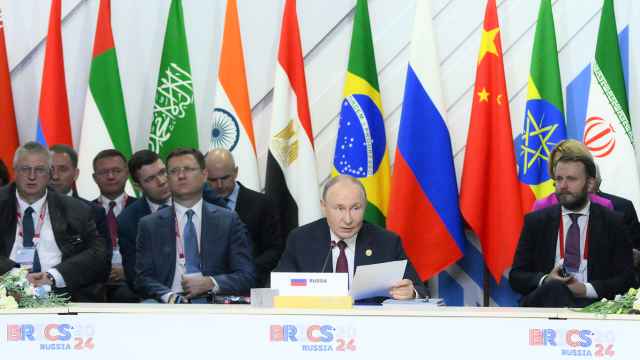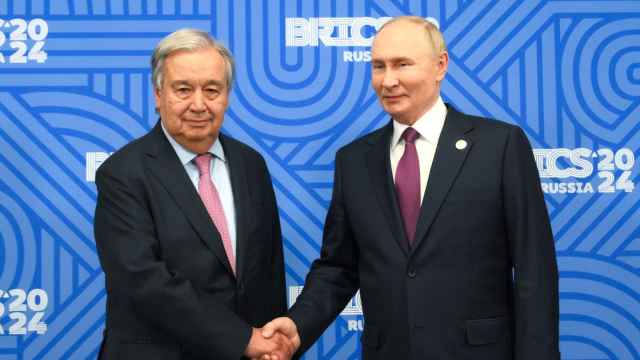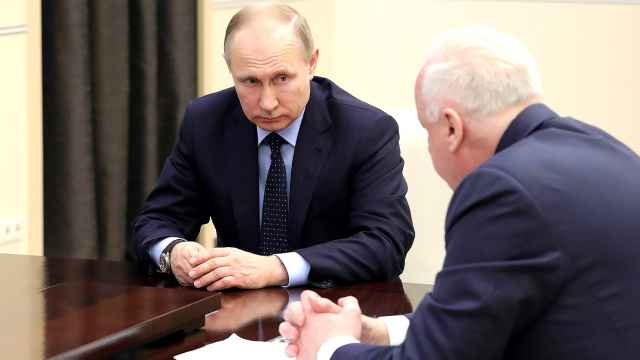At a Moscow news conference on Tuesday, NATO’s deputy assistant secretary-general, James Appathurai, pushed the U.S. proposal to share its missile defense technical specifications with Russia. This is part of a new U.S. “transparency campaign” to try to repudiate the Kremlin’s claims that U.S. missile defense installations in Europe will undermine Russia’s nuclear deterrence.
But to convince Russia that missile defense poses no threat to its security, perhaps the best “technical specifications” the United States could share with Moscow is evidence from leading U.S. nuclear physicists that missile defense simply doesn’t work.
Theodore Postol, an MIT physicist and former Pentagon science adviser, has argued that the Pentagon fudged missile defense test results to convince the U.S. Congress and taxpayers that the system has an 84 percent success rate. In reality, Postol argues, it can hit only 10 percent or 15 percent of its targets.
And this is in the best of circumstances — when the Pentagon knows exactly when an incoming missile will be fired as well as its trajectory, and when the weather conditions are ideal. In real battle circumstances, of course, the U.S. missile defense system would not have these luxuries.
There is another important factor that further skews the Pentagon’s seemingly miraculous test results: It considered a test successful when an interceptor simply hit the body of the oncoming missile. But an interceptor must hit the warhead itself to protect against an attack, a fact that even the Pentagon confirms. The problem, however, is that hitting the actual warhead is like hitting “a bullet with a bullet.”
To make matters worse, it is easy for an enemy to trick interceptors by using decoys, such as cheap inflatable balloons. Yousaf Butt, a leading U.S. nuclear physicist, argues that it is impossible for a missile defense system to distinguish real warheads from decoys. Thus, Russia could easily overwhelm the missile defense shield by inundating it with decoys.
Russia knows these facts better than anyone, but it chooses to ignore them and insist that U.S. missile defense poses a threat to its nuclear deterrence. The Kremlin’s obsession with missile defense is part of a broad political and foreign policy strategy of demonizing NATO and the United States to create a mythical enemy at its gates.
The irony is that the Kremlin’s seemingly hawkish line against Washington has helped create a nice gold mine for large U.S. missile defense contractors, such as Raytheon, Lockheed Martin and Boeing. The United States spent $8.5 billion on missile defense in 2011 alone and a total of $141 billion since 1985.
Why should these defense giants hire expensive Washington lobbyists and PR agencies to blow hot air about the United States’ amazingly successful and powerful missile defense capabilities when the Kremlin will do it for free?
A Message from The Moscow Times:
Dear readers,
We are facing unprecedented challenges. Russia's Prosecutor General's Office has designated The Moscow Times as an "undesirable" organization, criminalizing our work and putting our staff at risk of prosecution. This follows our earlier unjust labeling as a "foreign agent."
These actions are direct attempts to silence independent journalism in Russia. The authorities claim our work "discredits the decisions of the Russian leadership." We see things differently: we strive to provide accurate, unbiased reporting on Russia.
We, the journalists of The Moscow Times, refuse to be silenced. But to continue our work, we need your help.
Your support, no matter how small, makes a world of difference. If you can, please support us monthly starting from just $2. It's quick to set up, and every contribution makes a significant impact.
By supporting The Moscow Times, you're defending open, independent journalism in the face of repression. Thank you for standing with us.
Remind me later.





